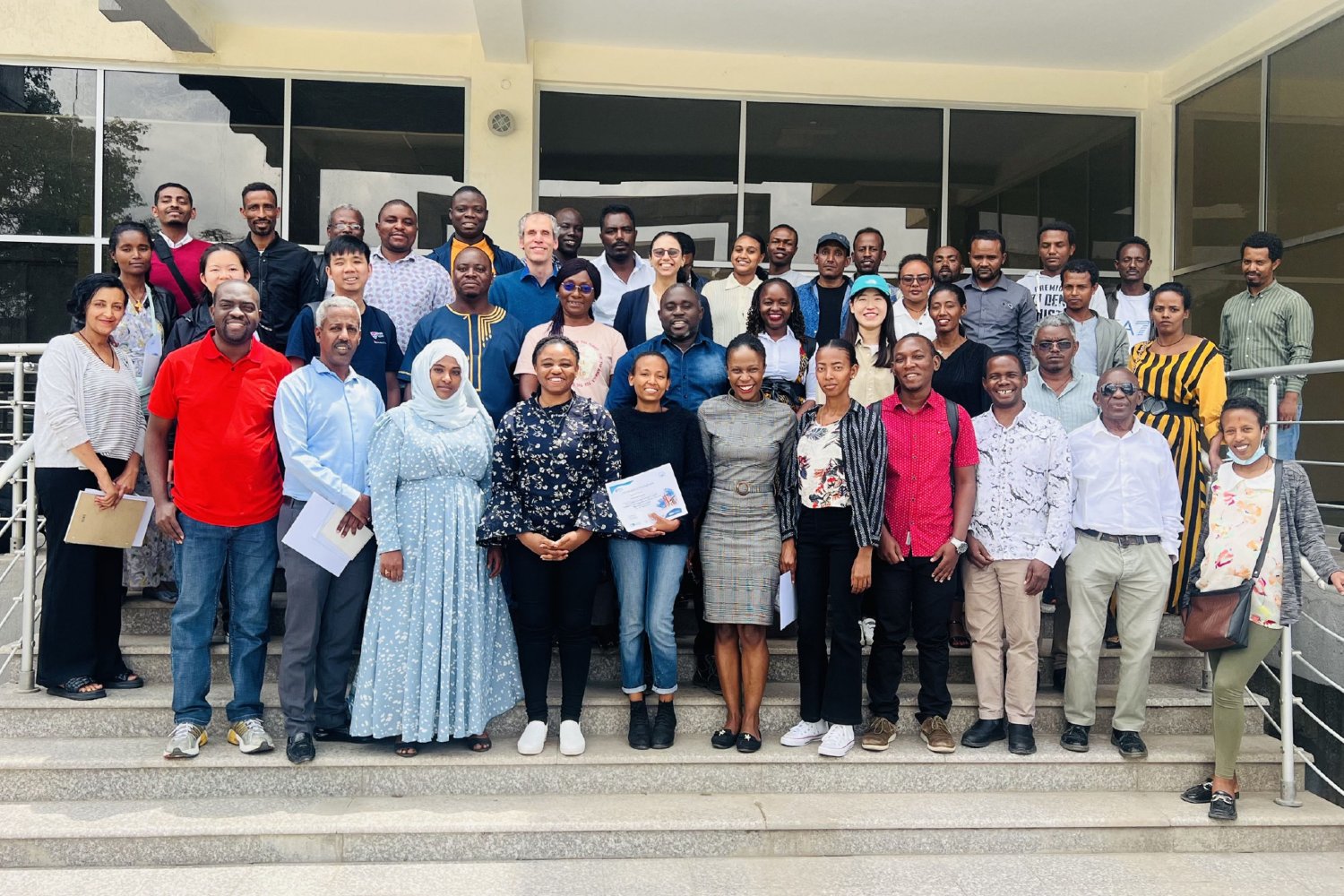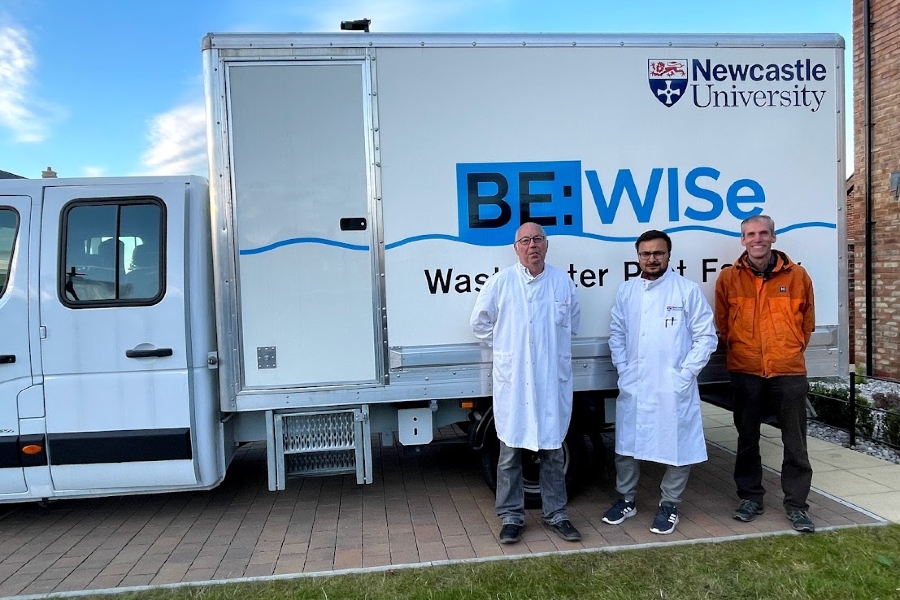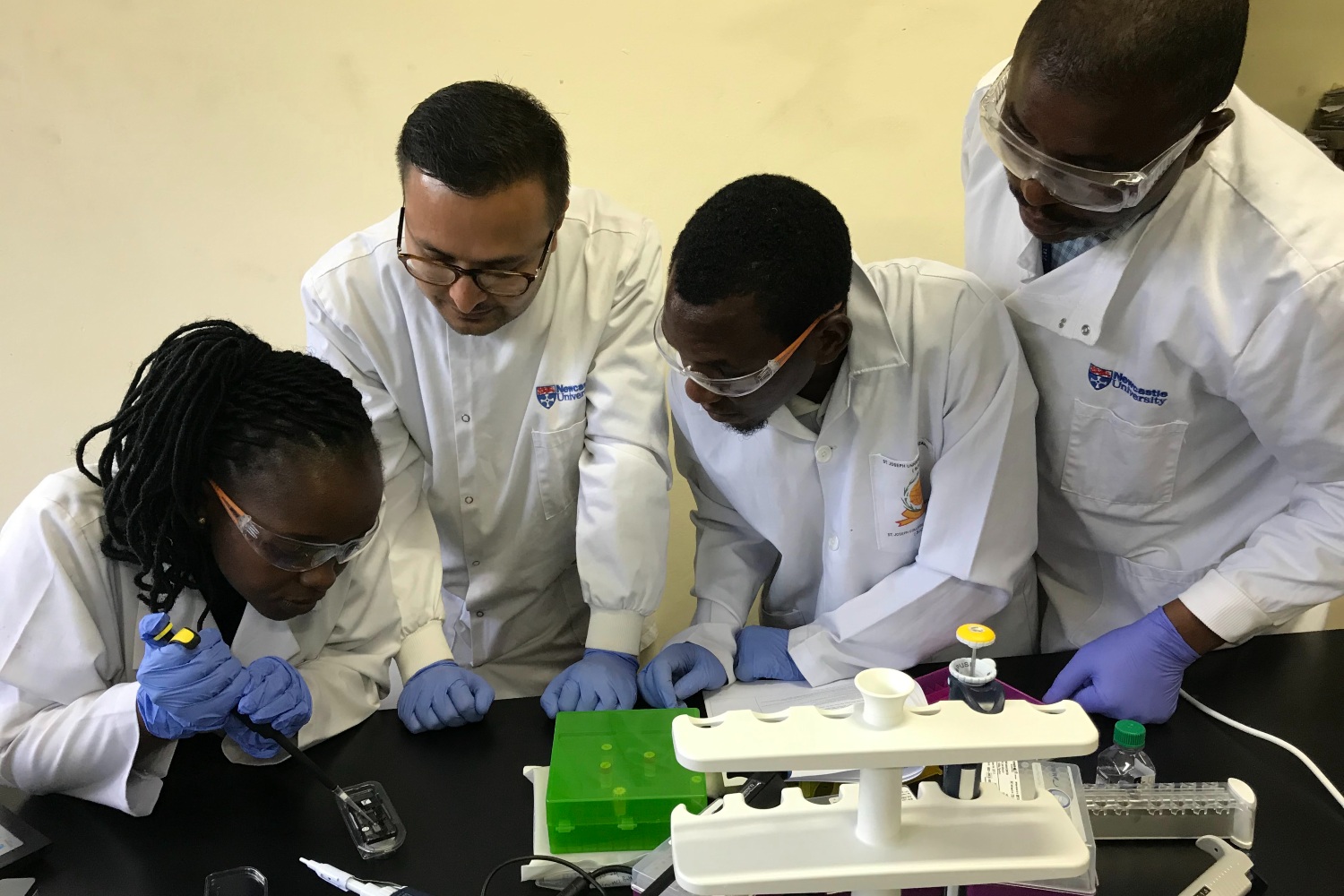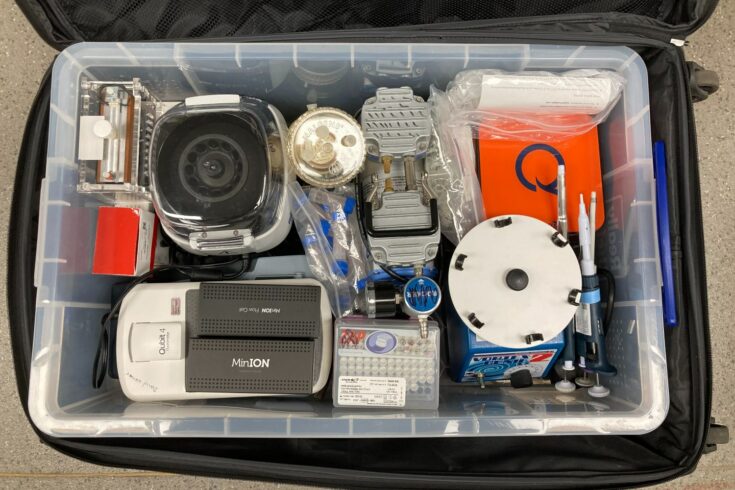The portable testing lab is believed to be the first of its kind.
Screening water samples at any location
The lab allows researchers to go to any location where waterborne disease is thought to be present and screen the water samples, enabling hazards to be identified:
- quickly
- easily
- cheaply
The data can be used on-site to:
- measure the effectiveness of wastewater treatment
- track faecal source pollution
- determine water safety
The affordability of the equipment and the speed of sampling gives public health officials a better opportunity to identify and deal with local hazards, potentially saving countless lives.
About the project
The suitcase lab initially carried out on-site testing of samples collected at Birtley sewage treatment plant in north-east England. It was then used to carry out water quality screening in the Akaki River catchment near Addis Ababa, Ethiopia.
Dr David Werner, Professor in Environmental Systems Modelling at Newcastle University, and the team have been working in the Akaki River catchment with:
- Addis Ababa Water and Sewerage Authority (AAWSA)
- Addis Ababa University
- International Water Management Institute (IWMI)
Dr Werner explains:
With our portable laboratory we successfully screened millions of bacteria in Akaki river water samples and discovered a high prevalence of Arcobacter butzleri, a still poorly understood waterborne hazard that can cause watery diarrhoea – which is, unfortunately still a leading cause of death among children under the age of five.
We have also established strong association of Vibrio cholerae hazards in these samples with human sewage pollution.
Portable tools
The portable tools required for the analysis include:
- a mini vacuum pump and filtration unit to screen out bacteria from water
- a vortex and mini centrifuge for the extraction of DNA from the captured bacteria
- a mini polymerase chain reaction (PCR) machine to amplify specific genes which are found in all bacteria
- a memory-stick sized MinIONTM sequencing device from Oxford Nanopore Technologies which reads millions of gene sequences to classify the bacteria
- a powerful laptop computer to rapidly interpret the sequencing data
- various small equipment items such as pipettes, tips and biohazard waste bags
As well as reducing the time required to measure water quality, the project enables the independent use of the tools by researchers and water systems engineers in Ethiopia.
Collaboration and training
Dr Alemseged Tamiru Haile from the IWMI is confident that this scientific break-through will make a difference in Ethiopia:
I am very happy with the successful collaboration and training that enables early career researchers in Ethiopia to independently investigate bacterial hazards in urban river and wastewater samples with state-of-the-art molecular diagnostics.

Water quality workshop Ethiopia, March 2023. Credit: Professor David Werner, Newcastle University
Ms Jemila Mohammed, who spent time at Newcastle University training to use the kit and is now Head of the Wastewater Quality Control Laboratory Subprocess at AAWSA says:
I am now in charge of World Bank investment into building a state-of-the-art wastewater laboratory for AAWSA and what I have learnt from Newcastle University researchers about advanced microbiology methods and their application to water quality and the monitoring of environmental antibiotic resistance is invaluable in guiding me in this work.
In Tanzania, trainees who have conducted fieldwork with the kit in an informal settlement now work as lecturers at:
- Ardhi University
- The Open University of Tanzania
- Mzumbe University
- the Institute of Rural Development Planning
They can pass on the knowledge gained to future generations of environmental engineers and scientists.
Affordable equipment
The initial investment of the ‘lab in a suitcase’, which includes a £1,000 sequencing device from Oxford Nanopore Technologies and powerful laptop computer, was approximately £10,000.
Dr Werner added:
This is an order of magnitude less than the equivalent conventional equipment and is affordable for our partners overseas. Their challenges now mainly relate to complex purchasing procedures and the lack of reliable supply chains. We are working with Oxford Nanopore Technologies and other equipment manufacturers to support our partners in Africa and beyond.
Impacts of the project
‘Lab in a suitcase’ has transformed water testing training across Africa, Asia and South America. It has delivered over a dozen workshops, upskilling more than 200 water, sanitation and hygiene experts in advanced molecular methods.
At a Pan-African workshop hosted by AAWSA, 37 trainees from 10 African countries have gained hands-on experience with techniques like plate counting, qPCR and 16S rRNA gene amplicon sequencing. This has enhanced their ability to analyse river and wastewater samples.
Ground-breaking fieldwork
By being a portable piece of kit, it has enabled ground-breaking fieldwork by GCRF-funded teams in Ethiopia, Tanzania, Malaysia and Nepal. It has been pivotal in tracking faecal pollution, assessing microbial risks and conducting wastewater epidemiology.
These innovative methods enhanced surveillance of waterborne diseases like cholera and emerging threats like antimicrobial resistance.
Lab in a van
The Newcastle University team, supported by the Reece Foundation, has also developed a mobile ‘lab in a van’ that successfully detected human sewage marker genes in UK rivers within three hours.
Field tests in autumn 2021 showed how storm-related sewer discharges impact urban park water quality, raising public health concerns. This innovative data now guides a multistakeholder effort to restore river health, supported by the Reece Foundation’s £1 million pledge and their new initiative, The Ouse Burn Way.
The technology is beneficial for global efforts to meet the sustainable development goal 6 (SDG6) target 6, which is to protect and restore water-related ecosystems including wetlands, rivers, aquifers and lakes.

‘Lab in a van’ scientists. Credit: Professor David Werner, Newcastle University
Recognition
In 2023, Newcastle University received the prestigious Queen’s Anniversary Prize for Higher and Further Education, celebrating its long-standing excellence in water research. The innovative ‘lab in a suitcase’ project is a standout example of this revolutionary work. The Tanzanian Ministry of Education, Science and Technology has awarded colleagues at Ardhi University a certificate for publishing their research in a high impact journal.
The teams’ achievements have also been published in leading journals such as:
- Water Research
- Science of the Total Environment
- Environment International
- Journal of Hazardous Materials
- Clean Water
Further development
The team is now collaborating to further develop the portable water analysis field kits with:
- Dr Cesar Motaand his group at the Universidade Federal de Minas Gerais, in Brazil
- Dr Soydoa Vinitnantharat at King Mongkut’s University of Technology Thonburi in Thailand
- Northumbrian Water and WRc in the UK to develop a portable testing device for sewage derived bacteria in inland and coastal waters

Dr Shaaban Mgana and colleagues from Ardhi University, Tanzania. Credit: Professor David Werner, Newcastle University
It has been developed by experts from Newcastle University and across Ethiopia as part of UK Research and Innovation’s Global Challenges Research Fund (GCRF) Water Security and Sustainable Development Hub.
Find out more
Read more about the GCRF Water Security and Sustainable Development Hub.
Watch a YouTube video from the Early Career Network.
Top image: 'Lab in a suitcase'. Credit: Professor David Werner, Newcastle University

